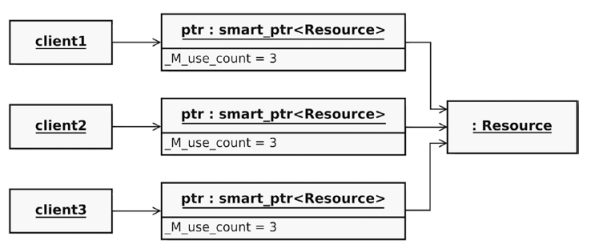C++11 引入了智能指针的概念,使用了引用计数的想法,让程序员不再需要关心手动释放内存。使用它们需要包含头文件memory,这些智能指针就包括
- std::shared_ptr
- std::unique_ptr
- std::weak_ptr
1 std::shared_ptr
std::shared_ptr可以与其他实例共享指针的所有权,T类型的资源管理的责任,由所有的shared_ptr实例一起接管。
使用内部的引用计数器来监控当前由多少个管理T类型的实例。当智能指针的最后一个实例被销毁时,T的资源才会被释放。
1.1 创建共享指针
```cppinclude
include
include
include
using namespace std;
int main()
{
//创建shared pointer的三种方式
//shared_ptr
//C++20引入,自动按照默认值初始化shared_ptr<string> p3 = make_shared_for_overwrite<string>();//默认空字符串//填充vectorvector<shared_ptr<string>> whoMadeCoffee;whoMadeCoffee.push_back(p2);whoMadeCoffee.push_back(p2);whoMadeCoffee.push_back(p1);whoMadeCoffee.push_back(p2);whoMadeCoffee.push_back(p1);//打印vectorfor (auto vec : whoMadeCoffee){cout << *vec << " "; //vec是共享指针}cout << endl;//借助指针修改内容(*p1)[0] = 'N';p2->replace(0, 1, "J");//重新打印vector,内容被修改for (auto vec : whoMadeCoffee){cout << *vec << " ";}cout << endl;//打印指针的引用计数cout << "p1 count:" << p1.use_count() << endl; //打印3cout << "p2 count:" << p2.use_count() << endl; //打印4return 0;
}
<a name="tur0R"></a>## 1.2 自定义deleter共享指针提供的默认deleter是`**delete**`。<br />我们可以在创建共享指针时,指定自定义的删除器。**注意:**`**make_shared()**`**函数不能指定deleter。**比如:```cppshared_ptr<string> p1(new string("nico"), [](string *p) { //这种方式,可以自定义deletercout << "delete " << *p << " in customer deleter" << endl;delete p;});
下面是需要自定义deleter的几个示例,充分说明了自定义删除器的重要性:
//共享智能指针,自定自定义删除器的示例#include <string>#include <fstream>#include <memory>#include <cstdio>class FileDeleter{private:std::string filename;public:FileDeleter(const std::string &fn) : filename(fn) {}void operator()(std::ofstream *fp){fp->close(); //关闭文件std::remove(filename.c_str()); //删除文件}};int main(){//创建临时文件,并指定删除器std::shared_ptr<std::ofstream> fp(new std::ofstream("tmpfile.txt"), FileDeleter("tmpfile.txt"));//...}
其实通过RAII的方式,我们可以让上面的代码更加优雅:定义一个类,让其构造函数执行初始化工作,让其析构函数执行清理工作(比如这里的关闭和删除文件)。这样智能指针只负责管理类的实例对象,并可以在默认delete时调用析构函数进行清理。
1.3 处理数组指针
由于C语言的规则,我们可能用一个类型指针表示一个数组(指针指向数组的首地址)。如果我们想用shared_prt管理数组的内存就会存在一个问题,因为shared_ptr默认删除器是delete ptr,这里我们需要的是delete[] ptr。
所以,管理数组指针时,我们需要自定义一个删除器:
//方法1:自定义删除器std::shared_ptr<int> p(new int[10], [](int* p){delete[] p;});//方法2:使用辅助函数替换默认删除器std::shared_ptr<int> p(new int[10], std::default_delete<int[]>());
2 std::unique_ptr
2.1 使用示例
std::unique_ptr 是一种独占的智能指针,它禁止其他智能指针与其共享同一个对象,从而保证代码的安全。
std::unique_ptr<int> pointer = std::make_unique<int>(10); // make_unique 从 C++14 引入std::unique_ptr<int> pointer2 = pointer; // 非法,独占,不能赋值给其他指针std::unique_ptr<int> pointer3(pointer); //非法,拷贝构造函数不能使用//make_unique_for_overwrite是C++20新增,自带默认值初始化std::unique_ptr<int> pointer = std::make_unique_for_overwrite<int>(); //值默认为0
注意: C++不允许定义**std::unique_ptr<void>**类型,因为unique_ptr没有实现类型删除,不知道类型的话就无法正确释放内存。shared_ptr是可以的。
一个简单的示例:
//独占智能指针#include <iostream>#include <string>#include <thread>#include <memory>#include <chrono>class Person{public:Person() = default;Person(std::string name, std::uint32_t age): _name(std::move(name)), _age(age){}~Person(){std::cout << "delete the class" << std::endl;}void show(){std::cout << _name << "\t" << _age << std::endl;}private:std::string _name;std::uint32_t _age;};int main(){{auto ptr = std::make_unique<Person>("barret", 30);ptr->show();//开启一个线程,看指针是否会在线程中释放std::thread([person = std::move(ptr)] {person->show();//结果是会在子线程结束后释放}).detach();}std::this_thread::sleep_for(std::chrono::seconds(3));//主线程等待3秒std::cout << "end main function" << std::endl;return 0;}
2.2 转移所有权
unique_ptr不能被赋值和拷贝,那有没有方法转移unique_ptr的所有权呢?方法如下:
release():放弃所有权,返回原始对象指针std::move():move语义转移所有权
使用示例如下:
std::unique_ptr<ClassA> up(new ClassA());ClassA* a=up.release();up失去所有权,返回ClassA对象指针std::unique_ptr<ClassA> up2(std::move(up));//up失去所有权,所有权转移给up2
2.3 自定义deleter
当然,也可以像shared_ptr一样自定义删除器,不过稍有不同的是,unique_ptr必须指定删除器的函数签名:
std::unique_ptr<std::string[], void(*)(std::string*)> up{new std::string[10],[](std::string* p){delete[] p;}};//或者使用std::functionstd::unique_ptr<std::string[], std::function<void(std::string*)>> up{new std::string[10],[](std::string* p){delete[] p;}};//或者使用decltype自动推导删除器的类型void my_free(std::string* p) { delete[] p; }std::unique_ptr<std::string[], decltype(&my_free)> up{new std::string[10], my_free};
2.4 处理数组指针
unique_ptr提供了一个偏特化的版本用于处理数组指针,这个版本会默认调用delete[]。需要注意的是,这个版本无法使用指针操作符*和->,只能使用数组操作符[],并且无法调用多态。
std::unique_ptr<std::string[]> up(new std::string[10]); // OKstd::cout << *up << std::endl; //编译失败std::cout << up[0] << std::endl; //OK
3 std::weak_ptr
弱引用指针std::weak_ptr不会引起计数增加,它没有所有权。std::weak_ptr 没有 * 运算符和 -> 运算符,所以不能够对资源进行操作,它的作用是
- weak_ptr创建需要通过shared_ptr赋值,表示指向此shared_ptr但不增加计数
- 检查 std::shared_ptr 是否存在, expired()在资源已经被删除释放时返回 true,否则返回 false。比判断
**use_count()**效率高。 - 通过lock()函数返回强指针,用于在短暂时间内将弱指针提升为强指针操作数据
shared_ptr无法释放的循环依赖例子:
#include <iostream>#include <memory>struct A;struct B;struct A{std::shared_ptr<B> p;~A(){std::cout<<"A deleted"<<std::endl;}};struct B{std::shared_ptr<A> p;~B(){std::cout<<"B deleted"<<std::endl;}};int main(){auto a=std::make_shared<A>(); //A计数1auto b=std::make_shared<B>(); //B计数1a->p = b; //B计数为2,无法释放b->p = a; //A计数为2,无法释放return 0;}
这里将A和B中p改为weak_ptr指针,则不会增加引用计数,A和B的计数为1,在main之后可以直接释放。
#include <iostream>#include <memory>struct A;struct B;struct A{std::weak_ptr<B> p; //改为弱引用~A(){std::cout<<"A deleted"<<std::endl;}};struct B{std::weak_ptr<A> p; //改为弱引用~B(){std::cout<<"B deleted"<<std::endl;}};int main(){auto a=std::make_shared<A>(); //A计数1auto b=std::make_shared<B>(); //B计数1a->p=b; //B计数为1,b超过作用域可以释放Bb->p=a; //A计数为1,a超过作用域可以释放Areturn 0;}
4 std::enable_shared_from_this
4.1 返回对象共享所有权
一个类继承std::enable_shared_from_this后,可以在方法中通过如下两个方法返回自身的智能指针:
- shared_from_this(): 返回当前对象所有权的shared_ptr指针
- weak_from_this(): 返回当前对象所有权的weak_ptr指针
注意:不能在构造函数中使用上面两个函数,因为调用构造函数时对象还没有创建完成,无法返回自身指针。
//enable_shared_from_this使用示例#include <iostream>#include <string>#include <vector>#include <memory>using namespace std;class Person : public std::enable_shared_from_this<Person>{public:string name;shared_ptr<Person> mother;shared_ptr<Person> father;//改为弱指针,这样kid就不会增加计数了:kid到parent为强指针,parent到kid为弱指针vector<weak_ptr<Person>> kids;Person(const string &n, shared_ptr<Person> m = nullptr,shared_ptr<Person> f = nullptr): name(n), mother(m), father(f){}~Person(){cout << "delete " << name << endl;}void setParentAndTheirKids(shared_ptr<Person> m = nullptr,shared_ptr<Person> f = nullptr){mother = m;father = f;if (m != nullptr){m->kids.push_back(weak_from_this()); //返回当前对象的weak_ptr}if (f != nullptr){f->kids.push_back(weak_from_this());}}};shared_ptr<Person> initFamily(const string &name){shared_ptr<Person> mom = make_shared<Person>(name + "'s mom");shared_ptr<Person> dad = make_shared<Person>(name + "'s dad");shared_ptr<Person> kid = make_shared<Person>(name);kid->setParentAndTheirKids(mom, dad);return kid;}int main(){shared_ptr<Person> p = initFamily("barret");cout << "barret's family exists" << endl;cout << "- barret is shared " << p.use_count() << " times" << endl;cout << "- name of 1st kid of barret's mom: "<< p->mother->kids[0].lock()->name << endl;//正常释放}
4.2 类内不能使用shared_ptr(this)
可能会有疑问,为什么一定要使用share_fron_this()和weak_from_this()来返回智能指针呢,我可以直接在成员函数中return shared_ptr<T>(this)啊,一样和函数返回值能匹配起来。答案是不能使用!!
智能指针使用的时引用计数,就需要针对某个对象指针在一个地方统一计数。所以我更愿意使用所有权(ownership)的概念,不仅仅称呼其为指针。所有权只能在一个地方进行管理,比如你有一万块钱存入了某银行,那这个银行就拥有了这笔钱的所有权,你所有的存取支付都需要通过这个银行来操作(shared_ptr就像是支付宝和微信关联同一个银行卡)。你无法通过其他银行处理这笔钱,其他银行没有这笔钱的所有权。
而return shared_ptr<T>(this)会打破统一所有权,它会返回一个智能指针,但是带着新的所有权,而不是和已经存在的其他智能指针共享同一个所有权。这就出现了两个银行同时宣布拥有某一笔钱所有权的问题。引用计数这时候就失效了,因为它压根不知道在另一个地方还有一个堆同一对象的所有权管理。
看下面例子:ptr1和ptr2都认为自己独立拥有Foo对象的所有权,函数结束会导致对象释放两遍。
//演示类对象如何返回自身共享所有权//以及return shared_ptr<T>(this)导致引用计数失效的问题#include <iostream>#include <memory>using namespace std;class Foo : public enable_shared_from_this<Foo>{public:~Foo(){cout << "Foo is deleted" << endl;}shared_ptr<Foo> getPointer(){// return shared_from_this(); //返回对象所有权的共享指针return shared_ptr<Foo>(this);//返回共享指针,但跟其他指针不共享所有权}};int main(){//创建两个智能指针auto ptr1{make_shared<Foo>()};auto ptr2{ptr1->getPointer()};//shared_from_this,所有权引用计数是2//shared_ptr<Foo>(this),所有权引用计数是1,导致内存重复释放cout << ptr1.use_count() << endl;cout << ptr2.use_count() << endl;}
5 智能指针如何与vector配合??
记住两个原则:
- C++的Vector 保存原始指针,Vector 析构的时候是不会释放指针指向的堆对象,
- 如果用Vector保存智能指针,可以释放智能指针所指向的对象的
示例如下:结果是四次create,两次delete。
#include <iostream>#include <vector>#include <memory>using namespace std;class Human{public:Human() { cout << "create Human" << endl; }~Human() { cout << "delete Human" << endl; }};int main(){vector<Human*> list1 = { new Human(), new Human() };vector<shared_ptr<Human>> list2 = { make_shared<Human>() ,make_shared<Human>() };return 0;}
6 智能指针类型转换
和基本类型、原始指针一样,智能指针也能进行类型转换。从一个类型的指针转换为另一个类型的指针,其cast函数和普通类型的cast函数很相似:
- std::static_pointer_cast
- std::dynamic_pointer_cast
- std::const_pointer_cast
- std::reinterpret_pointer_cast
上述函数可以直接转换只能指针。如果想用不带_pointer_系列的cast函数,需要提取出原始指针再转换,不能直接转换智能指针。示例:
#include <iostream>#include <memory>struct BaseClass {};struct DerivedClass : BaseClass{void f() const{std::cout << "Hello World!\n";}~DerivedClass() { // 注意:它不是虚的std::cout << "~DerivedClass\n";}};int main(){std::shared_ptr<BaseClass> ptr_to_base(std::make_shared<DerivedClass>());//ptr_to_base->f(); // 错误不会编译: BaseClass 无名为 'f' 的成员std::static_pointer_cast<DerivedClass>(ptr_to_base)->f(); // OK// (构造临时 shared_ptr ,然后调用 operator-> )static_cast<DerivedClass*>(ptr_to_base.get())->f(); // 亦 OK// (直接转型,不构造临时 shared_ptr )}

